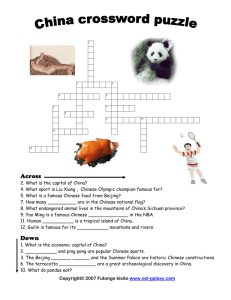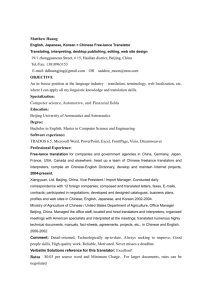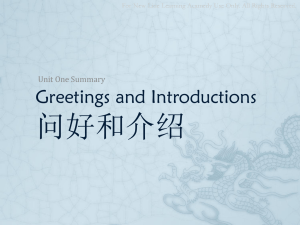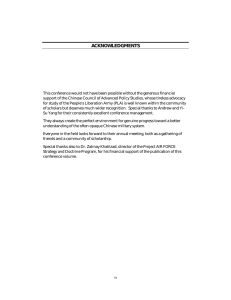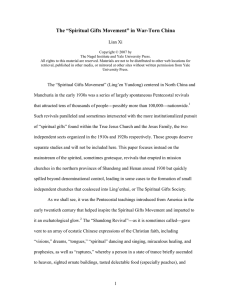The May Fourth Movement HI 168: Lecture 6 Dr. Howard Chiang
advertisement
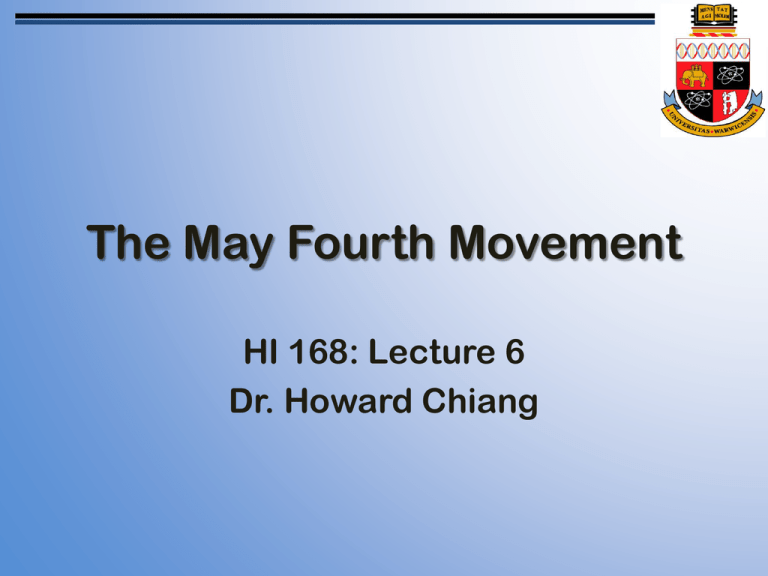
The May Fourth Movement HI 168: Lecture 6 Dr. Howard Chiang Warlords: 1916-1928 - Warlord (chun-fa, 軍閥): one who commanded a personal army, controlled or sought to control territory, and acted more or less independently - ‘regional militarist’ maybe more neutral - Warlord era (1916-28): a period when the country was divided among regional military cliques whose leaders had evolved from the generals who were trained in the New Army by Yuan - 1917: last attempt to restore the monarchy by Zhang Xun (張勳) – Puyi then expelled in 1924 - Puyi lived in the Japanese concession in Tianjin until 1932, when he was installed by the Japanese as ruler of Manchukuo (officially crowned as emperor in 1934) Zhang Xun Warlords: 1916-1928 - North: - Anhui Hegemony (1916-1920): Duan Qirui 段祺瑞 - Zhili Hegemony (1920-1924): Feng Guozhang 馮國璋 - Fengtian Hegemony (1924-1928): Zhang Zuolin 張作 霖 - South: - Constitutional Protection (1917-1922): Sun in exile - Reorganization (1923-1925): Sun returned to power - Northern Expedition (1926-1928): Chiang Kai-shek - Southern provinces - Yunnan, Sichuan, Guizhou, Hunan, Guangxi, and Guangdong (including Hainan) - Note: Western nations supplied ammunition and guns to warlords Major Warlord Coalitions New Culture Movement - Intellectuals turned against Yuan Shikai after 1915 - Revolutionaries joined Liang Qichao – renunciation of politics - Chinese culture – a symptom of deeper morbidity - esp. Confucianism, which survived the fall of the dynasty and was being transmitted in every family - Late 1910s: political change should wait for cultural change – ‘culture’ (wenhua, 文化) meant ‘transformation by civilized patterns’ in classical - May Fourth = New Culture + Politics - New Culture Movement: the rejection of traditional culture and attempts to define a new cultural base and direction New Youth (1915) Chen Duxiu (陳獨秀), ‘Call to Youth’: “The Chinese compliment others by saying, ‘He acts like an old man while still young’. Englishmen and Americans encourage one another by saying, ‘Keep young while growing old’. Such is one respect in which the different ways of thought of the East and West are manifested. Youth is like early spring, like the rising sun, like trees and grass in bud, like a newly sharpened blade. It is the most valuable period of life. The function of youth in society is the same as that of a fresh and vital cell in a human body. In the processes of metabolism, the old and rotten are increasingly eliminated to be replaced by the fresh and living.” Chen Duxiu - China needed Mr. Science & Mr. Democracy Language and Education - Language reform: from classical to vernacular (baihua, 白話) Chinese - one of its strongest proponents was Hu Shih (胡適): ‘A dead language can never produce a living literature; if a living literature is to be produced, there must be a living tool….We must first of all elevate this [vernacular] tool….Only with a new tool can we talk about such other aspects as new ideas and new spirit.’ - 1921: Ministry of Education endorsed vernacular form - Beijing University (Beida, 北京大學) - 1898 Imperial University; 1912 National U of Beijing - 1916: Cai Yuanpei (蔡元培) appointed president - Tertiary institutions in BJ: 10 in 1909 to 40 in 1922 Hu Shih Cai Yuanpei (President of Beida) Japan and the Shandong Issue - 1914: Japan took Qingdao from Germany - 1915: Japan presented Yuan ‘Twenty-One Demands’ - Yuan accepted on May 7 – National Humiliation Day - spring – wave of anti-Japanese riots and protests - 1917 China gave up neutrality in WWI - China sent 100,000 workers to northern France - Chinese were entitled to participate in the 1919 Versailles Conference - Chinese delegation shared Woodrow Wilson’s ‘selfdetermination’ principle - the Chinese wanted to recover Shandong - But Japan, after 1914, signed secret treaties with Russia, Britain, France, Italy, and the United States Japan and the Shandong Issue - Outsiders continued to decide China’s future with no consultation with Chinese leaders - 1918 – Chinese leaders on their own volition signed a secret treaty with the Japanese - In exchange for a 20 million yen loan, the Beijing government gave Japan rights in Shandong: to build two railroads, to station troops there, and to train and oversee Chinese train guards - May Fourth Incident vs. Movement vs. Era - incident: student demonstration in Beijing on May 4, 1919, in protest against the Versailles Treaty - movement: strikes and boycotts that followed - era: revitalization of public sphere in early 1920s Gate of Heavenly Peace (Tiananmen), 1919 Cao Rulin May Fourth Movement: 1919-21 - May 4, 1919: Beijing’s Gate of Heavenly Peace (Tiananmen, 天安門) - Students marched on to the house of Cao Rulin (曹汝霖) - cabinet member, Qing official, aide to Yuan Shikai - students found Zhang Zongxiang (章宗祥) instead - Martial Law was declared around the Legation Quarter - the arrests of students also turned May Fourth into a spark - the arrested students attracted support from a wide range of Beijing’s citizens, and protests spread to all major cities - Student organizations – reached women, high school students, principles, other professionals, & workers May Fourth Movement: 1919-21 - the movement shifted to anti-Japanese actions - burning & boycotting Japanese goods - further involvement of merchants & workers - government received diplomatic pressure from Japan - by June, Shanghai replaced Beijing as the main focus of the May Fourth movement - In France – the Versailles Treaty was thus concluded on June 28 without official Chinese endorsement - 1922: dispute over Shandong was eventually mediated by the US at the Washington Naval Conference - Shandong was agreed to be returned to China on February 4 Japanese Delegation at Paris Peace Conference in 1919 Political Significance of May 4th - Street Politics & Students - students’ claims to be acting selflessly were critical to their legitimacy - even Chinese who disagreed might admire them - precedents: student-merchant boycott in 1905; popular protests against Twenty-One Demands in 1915; anti-Manchu movement since 1900; legacy of reformist intellectuals such as Kang Youwei - Unprecedented quantitatively and qualitatively - led to a new basis for political activity - created a multi-class political agenda based on antiimperialism and opposition to venal Chinese administrations Political Significance of May 4th - set the pattern for future protests as it trained future leaders - brought thousands of people to treat policy questions as personally important - long-term approaches – independent political party - political professionalization: new Party member - Gender – women’s rights - only in the wake of the spread of educational and employment opportunities did women begin to emerge as a major social force in their own right - much remained dominated by the voices of men - Ding Ling’s Miss Sophia’s Diary (1927) next week Ding Ling (丁玲)
